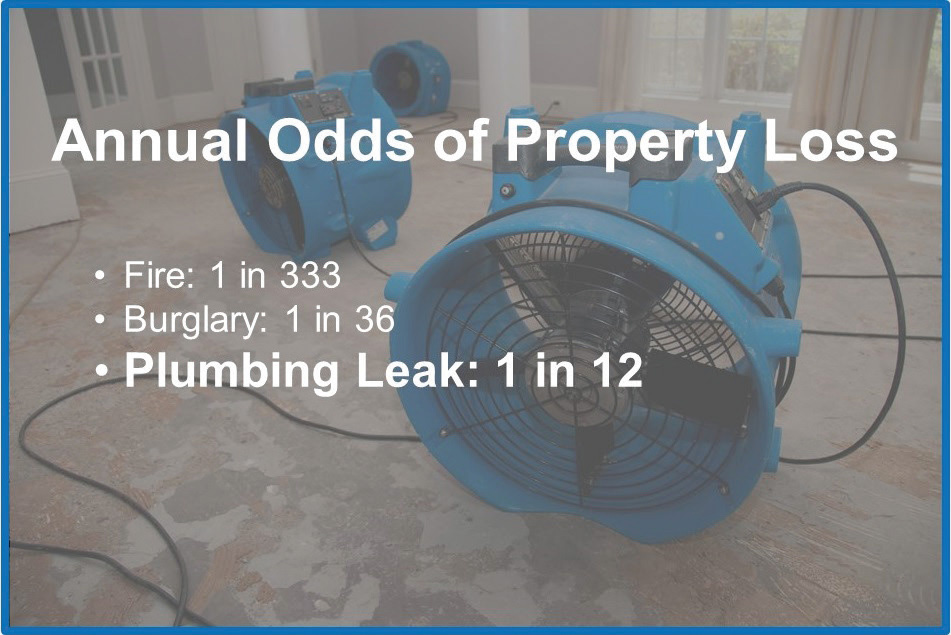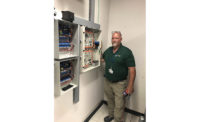It’s an outside force that every habitable property confronts. It exerts 50 to 100 pounds of constant pressure on a multitude of potential failure points. It’s three times more likely to cause property loss than burglary and it costs the insurance industry more than $10 billion in annual claim remediation. I’m talking about water.
If you’re a security integrator who isn’t recommending plumbing leak detection and control devices, you’re leaving your clients exposed, while your business leaks opportunities. Here’s why smart security integrators are recognizing the benefits of the latest in leak control technology: intelligent flow-based devices.
You may be aware of leak-detecting moisture sensors that are becoming commonplace additions to many security systems and DIY solutions. Some moisture sensors even have auto shutoff valves. These are effective when the leak contacts the sensors, and for preventing damage when auto shutoff valves are integrated. Another type of plumbing leak security, integration-ready flow-based systems, such as that pioneered by the FloLogic brand, comprehensively detect leaks that appear anywhere in a plumbing supply: along any pipe, connection line or appliance, inside or outside.
Here’s how flow-based leak control works. Typical water use is episodic, whereas leaks are constant. Systems such as FloLogic flags any flow that exceeds the set flow time allowances, then triggers an alarm where the supply valve closes to prevent water damage. When leaks are detected, monitoring allows real-time customer notification. Integration with security automates FloLogic’s status change between “home” (allowing enough flow time for showers and normal use), and “away” (allowing only enough flow for ice makers to operate). FloLogic has standard dry contacts that connect to virtually all systems on the market and can tie into moisture sensors. New Wi-Fi connectivity and app control with API will enhance its integration potential.
For Masters Security by Vyanet in Telluride, Colo., flow-based leak control is integrated into security systems as a standard practice. Their market, servicing the Colorado ski country, includes often unoccupied vacation homes and extreme cold, where risk of plumbing leak damage is elevated. “Leaks from frozen pipes would likely be missed by moisture sensing devices, so we exclusively recommend flow-based systems,” said Jim Welch, operations manager. “We recommend the FloLogic System since it integrates easily with alarm panels and is the most thorough for catching leaks — even the small ones — in real time, anywhere in a plumbing supply.”
Installation of auto water shutoff devices requires a plumber to connect the valve into the main water line entering the property, so Masters Security by Vyanet has a short list of plumbers who handle the basic pipework. The rest of the wiring and system integration does not typically require an electrician and is simple for security technicians.
For selling customers on the need for leak control, some education is required. “On the surface, water damage isn’t as scary as burglary and fire threats, but clients can be convinced of the need for leak protection with fact-based selling. We explain that water damage is the biggest threat, and when you share your own first-hand accounts of the destruction a simple plumbing leak has caused homes nearby, most customers understand why leak control is vital to total home security,” Welch said.

“A secondary benefit of flow-based leak control is water waste prevention,” Welch said. “Water is a scarce and expensive resource in our market. Leaks from a stuck toilet flapper or outside hose bib wouldn’t damage property, but could add thousands to a water bill over time.”
While vacation home markets, like that served by Masters Security by Vyanet, are especially well-positioned for selling leak control, the insurance industry is promoting the category throughout the country. More insurers, from those catering to high-net-worth clients with second homes, to those which cover primary homes of the masses, are recommending leak control with auto shutoff. Many are providing premium discounts for device installation while some are requiring installations in order for clients to maintain coverage. Flow-based leak control systems provide insurance compliance and the most comprehensive protection to secure your clients against potential plumbing leak destruction.




